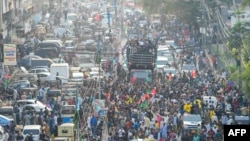A new survey indicates that more than two-thirds of Pakistan citizens lack faith in the integrity of their electoral process and government ahead of Thursday’s parliamentary elections.
The U.S.-based Gallup polling company found that Pakistanis are increasingly discouraged by economic, political, and security challenges that threaten their country’s stability, with discontent reaching a record high before the vote.
The survey said that the political atmosphere “is equally as glum as the economic one” ahead of Pakistan’s first general election since 2018. “Seven in 10 Pakistanis lack confidence in the honesty of their elections,” it added.
In addition to their skepticism about elections, 88% of Pakistanis also believe corruption is widespread within their government.
Pakistanis' economic pessimism has hit an 18-year high, with 70% believing conditions are worsening where they live.
Gallup said it conducted face-to-face interviews with a random sample of 1,000 adults aged 15 and older in Pakistan between September and October 2023.
The poll found that the political landscape in the nuclear-armed South Asian nation of about 241 million people had remained unsettled since the ouster of former Prime Minister Imran Khan.
A parliamentary vote of no-confidence removed the 71-year-old Pakistani leader from power.
Khan has been in jail since August when a court found him guilty of corruption and sentenced him to three years. Last week, the imprisoned cricket hero-turned-politician was sentenced to 14 more years on highly controversial charges of corruption, unlawful marriage, and leaking state secrets.
Khan rejects all the charges launched against him since his ouster as baseless and politically motivated. He says the powerful military has orchestrated them to block his return to power.
Pakistan’s electoral commission has also banned Khan and many other candidates from his Pakistan Tehreek-e-Insaf, or PTI, party from politics. The Supreme Court also has backed the commission’s decision to deprive the former cricket captain’s party of its iconic cricket bat electoral symbol.
PTI has been subjected to months of military-backed state crackdowns, with hundreds of grassroots workers, including candidates, detained, abducted, and forced to quit the party or back out of the elections or politics altogether. Many PTI candidates use social media platforms affiliated with the party to campaign and avoid getting arrested.
Gallup researchers said the state crackdown had been met with “palpable public anger.” It “is likely linked in some way to the low levels of confidence in the honesty of the elections,” Khorshied Nusratty, director of media relations and principal communications advisor at the American organization, told VOA.
Despite the crackdown, Khan is the most popular politician, with his party the largest political force in Pakistan, according to public polls.
“Political unrest arising from a disenfranchised voting public may lead to increased instability over the short term,” authors of the survey were quoted as saying. “This may further deter the foreign investment Pakistan badly needs to grow its economy and reverse its fortunes in the long term.”
Gallup researchers said that without a popular mandate, whoever wins the election in Pakistan will find it challenging to implement reforms. They underscored the importance of the outcome of Thursday’s election in Pakistan for regional stability.
“With a young population, economic potential, and a considerable stockpile of nuclear weapons, Pakistan’s stability continues to be a security imperative, even if it fails to make headlines among other more pressing conflicts.”
The military-backed caretaker government in Islamabad has denied it is cracking down on PTI to keep it out of the polls.
Pakistani Information Minister Murtaza Solangi has pledged that his administration is determined to conduct “peaceful, fair, free, and transparent elections” on Feb. 8, saying dozens of foreign observers and media representatives have been invited to monitor the vote.
The United States said on Monday that it was closely monitoring Pakistan’s electoral process, stressing broad participation and respect for freedom of expression and association.
“We’re concerned by some of the infringements we’ve seen in that space,” Vedant Patel, the U.S. State Department principal deputy spokesperson, told reporters in Washington.
“Pakistanis deserve to exercise their fundamental right to choose their future leaders through free and fair elections without fear, violence, or intimidation, and it is ultimately for the people of Pakistan to decide their political future,” Patel said.






